Trusted by:
Updated: June 24, 2025
12 min read
How To Use Certificates in B2B or B2C Marketing - Certificates as a Marketing Tool
In this article, we're discussing the topic of how to turn certificates into an effective B2C or B2B marketing tool. Let's see ideas and examples for using certificates in different types of businesses.
Creating and issuing certificates brings many benefits. A properly designed certificate that gets into the right hands will support your brand-building efforts, can help you increase employee motivation and satisfaction, improve the sales performance of your e-learning products, and strengthen other marketing and sales objectives... Listing all the benefits of issuing certificates would take quite a long time.
But how exactly can you leverage certificates in your marketing to achieve these benefits?
Certificates in B2B marketing - ideas and examples
B2B companies can use certificates as a tool that promotes affiliate or referral programs. Certificates can work as “proof" that an organization or person actually works with a certain B2B company and is authorized to promote its products or services.
This type of certificate adds value to your affiliate program and makes your partners look more credible in the eyes of their potential customers. Such a certificate proves that the company or person who offers, e.g., CRM software really knows how to use it and is trustworthy. Additionally, partner certification increases brand awareness among your prospects.
This is how certificates are used by some of the most well-known software development companies in the world, businesses that create sophisticated digital products such as Adobe, Salesforce, HubSpot, Marketo, or businesses offering e-commerce platforms headless architecture capabilities for e-stores, such as Shopify.
1. Salesforce Certification System:
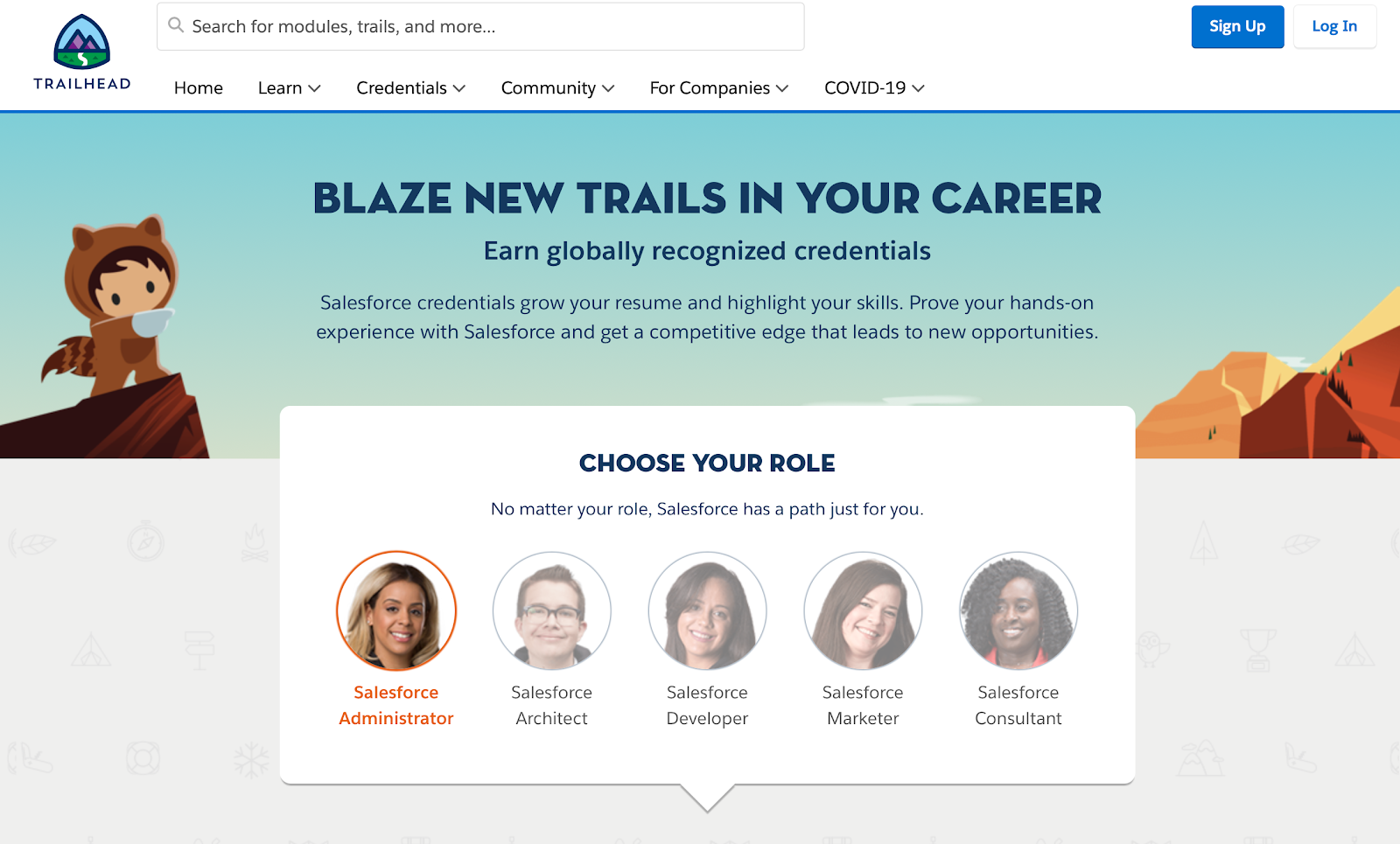
2. Shopify affiliate program completed by receiving a certificate:
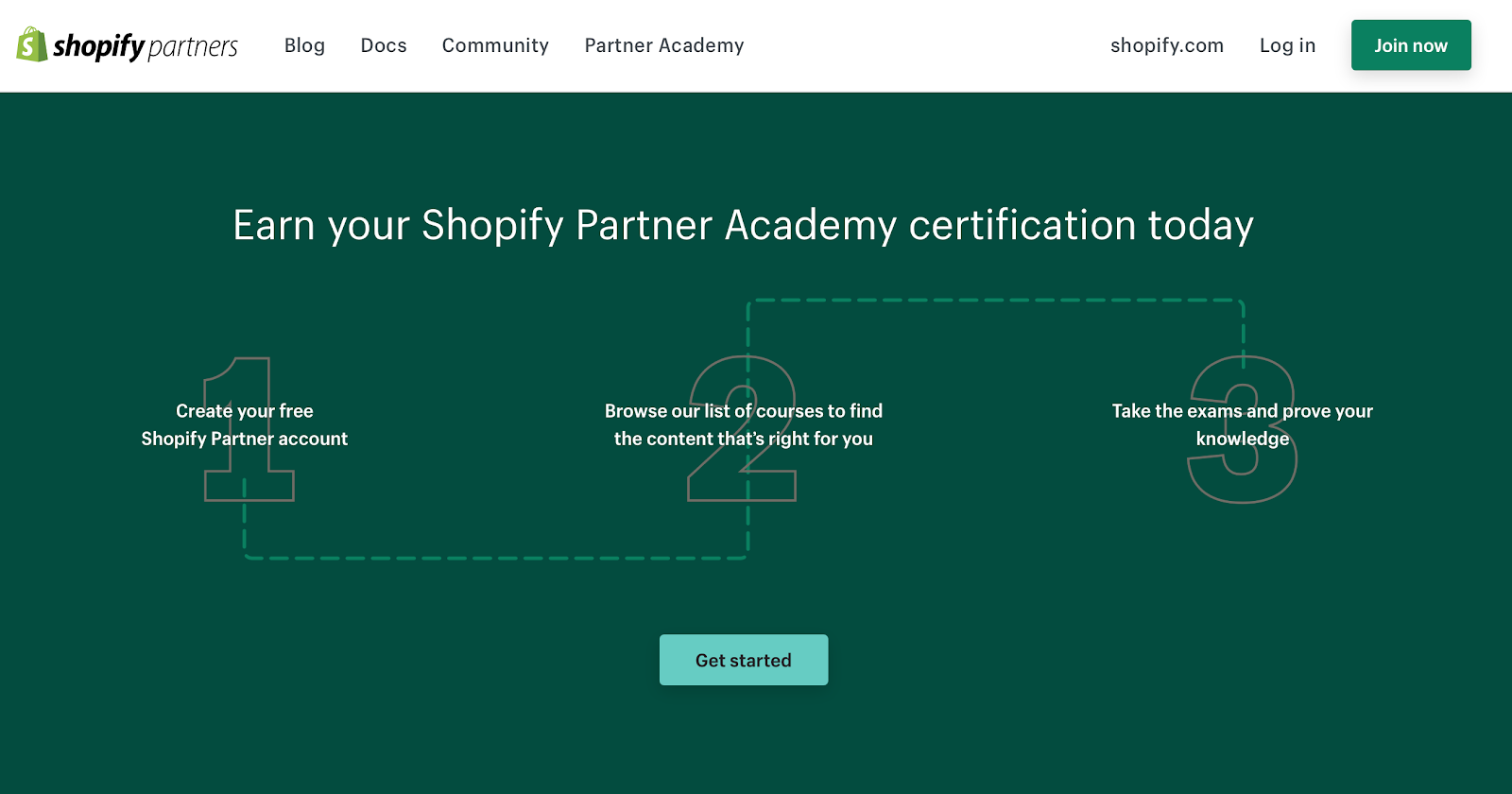
3. HubSpot Academy certifying partners:

4. Adobe Certification Program:
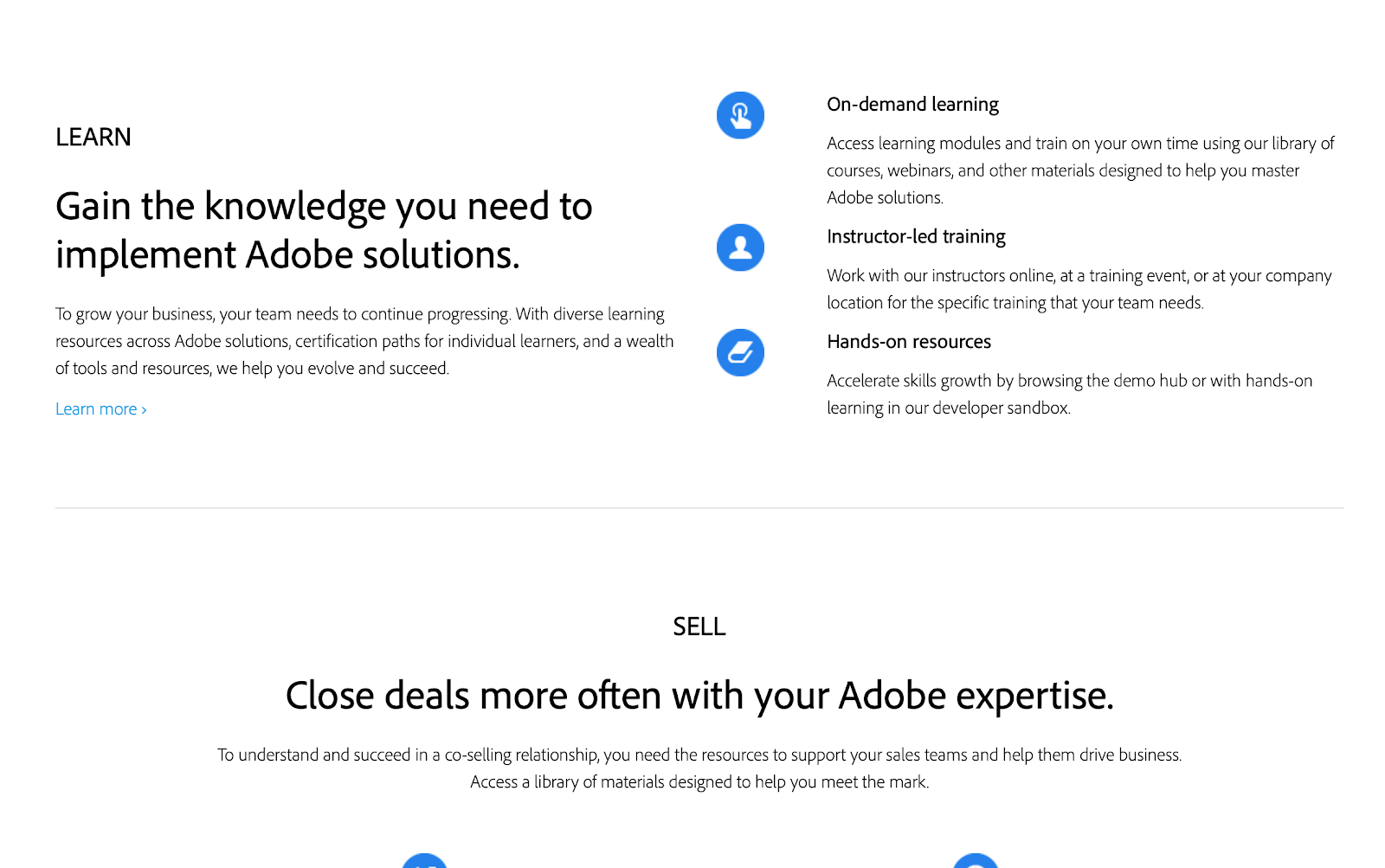
In the world of IT services, it is also very common to certify professionals experienced in a particular technology. Companies that provide cloud services such as AWS (Amazon Web Services), Google Cloud, or Microsoft Azure offer entire e-learning platforms and certification systems for people who want to work or improve their skills in a given technology, such as open source observability.
Developers who want to start using Flutter (an SKD created by Google which keeps gaining popularity lately), can also take appropriate courses and get the certification.
Since Google, just like HubSpot, offers plenty of courses for marketers, now every person who wants to gain or improve their skills in any marketing-related field can do it. But not only that. They can also prove that they took a course thanks to an extended certification program offered by Google.
5. Google Certificates for Developers:
6. Courses and Amazon Web Services Certification:
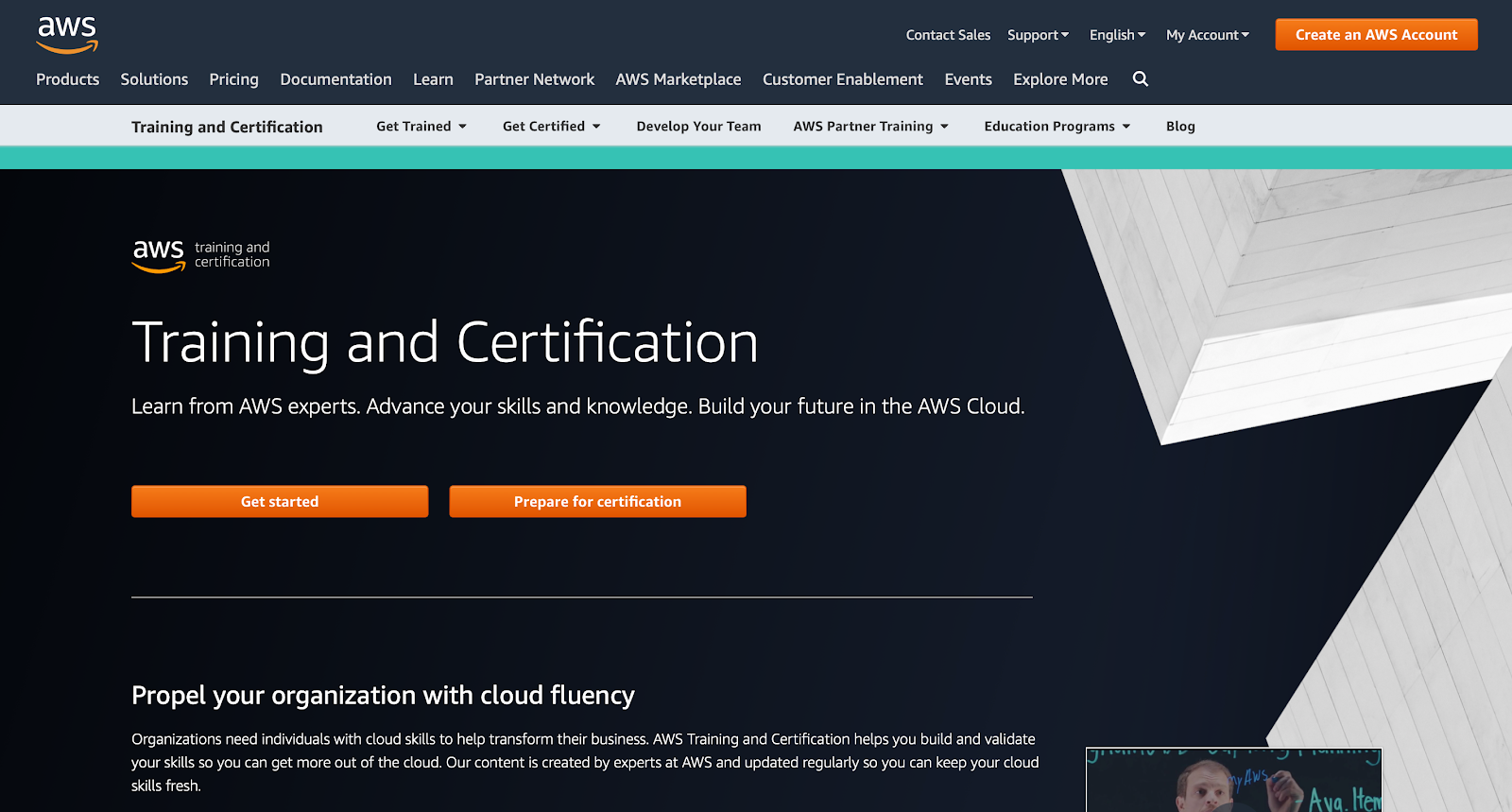
AWS DevOps Engineer certification shared on Medium:

HubSpot certifications for marketers added to a LinkedIn profile and shared on Twitter:
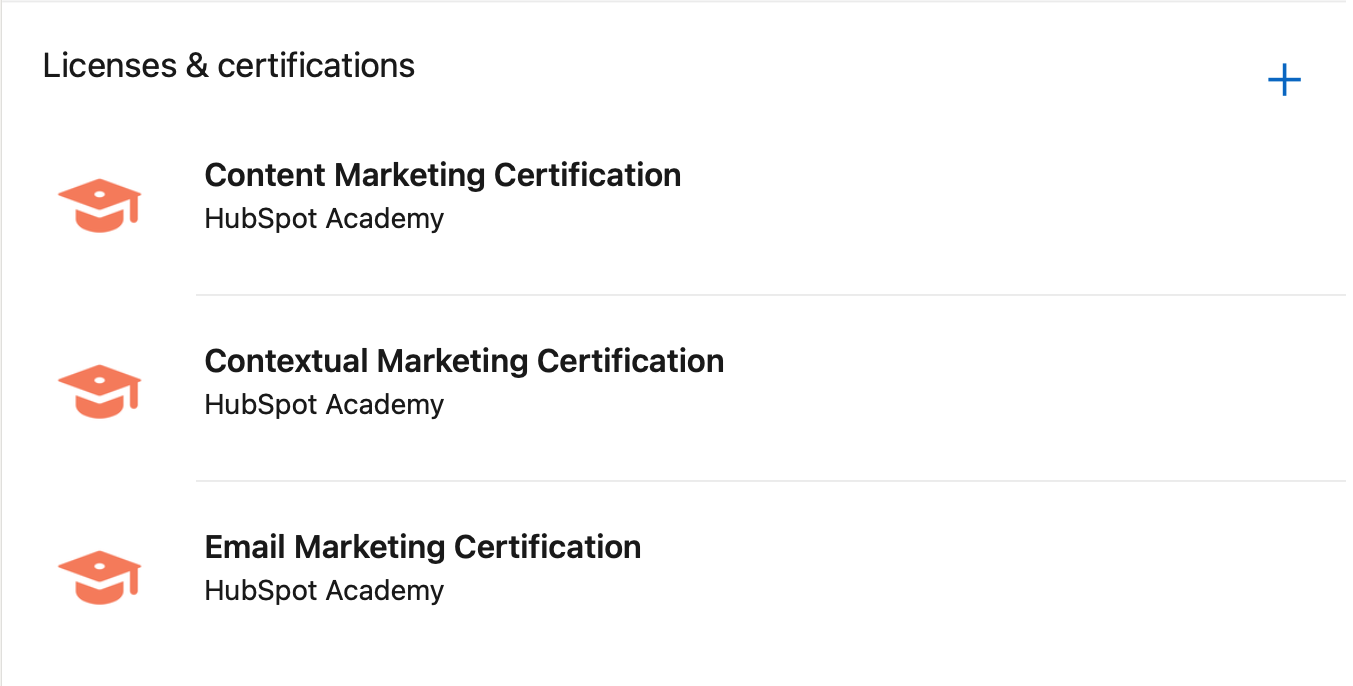
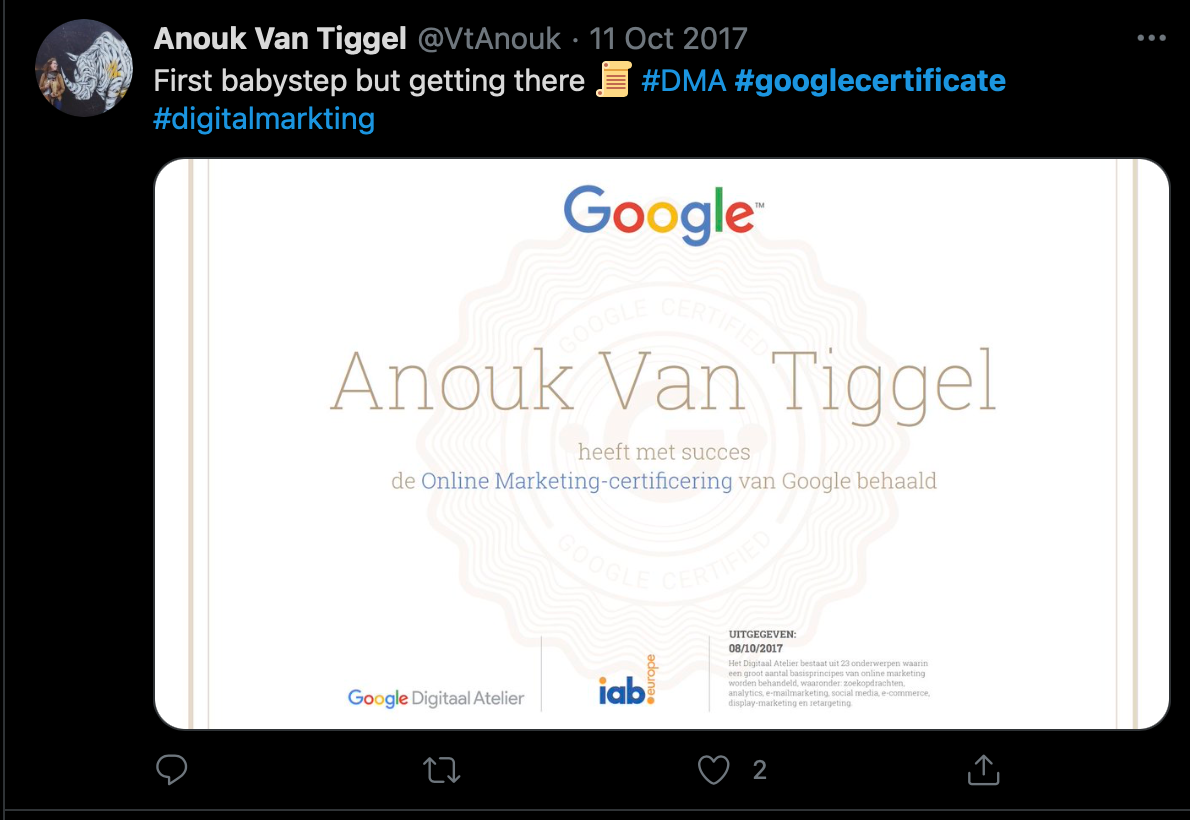
IBM courses in data analytics supplemented by a certification:
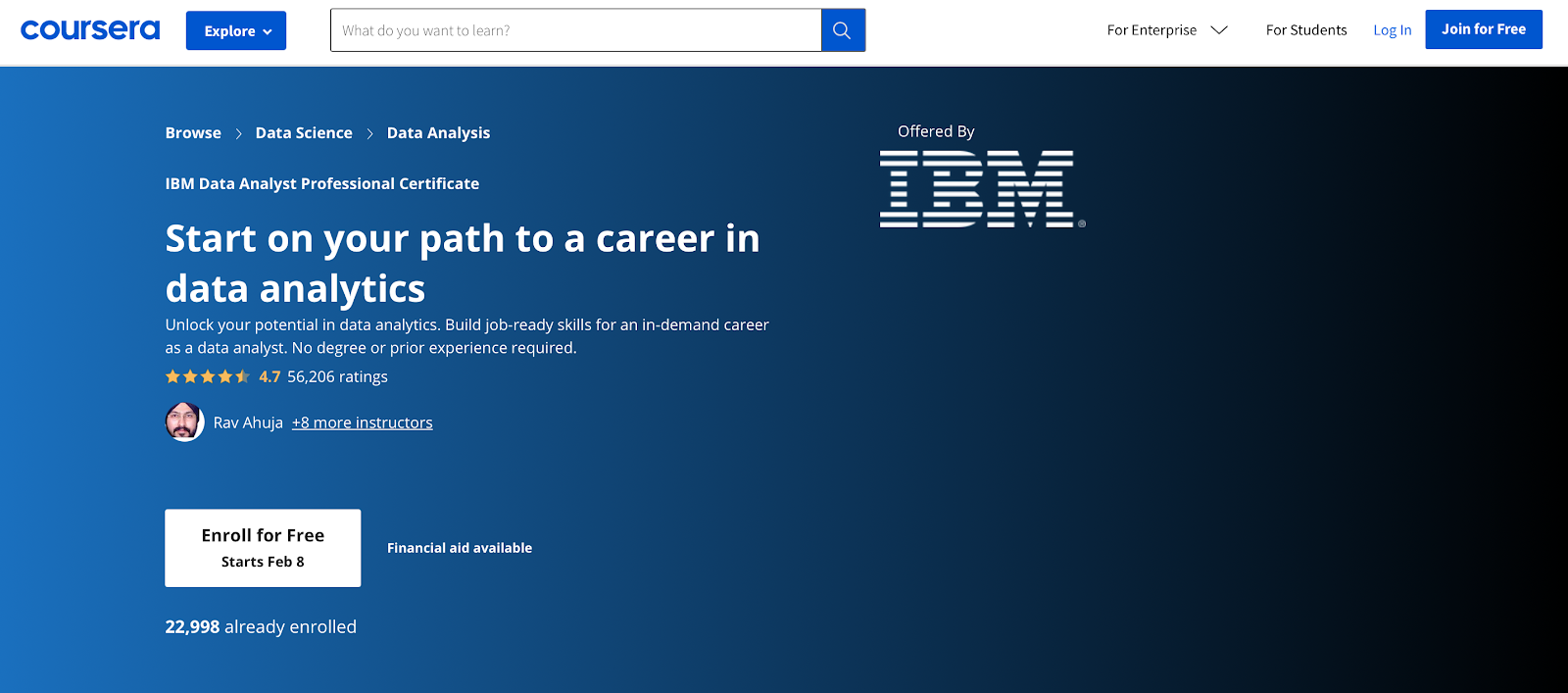
Certificates in B2C marketing - ideas and examples
B2C companies that offer their products or services to individual customers can also use certificates as a marketing tool. In this case, certificates will work as a way to build relations between the company and its clients and will be an important element in customer building loyalty.
However, this is not the only use of certificates in B2C marketing. Various types of certifications or badges, especially those that are readily available, are an important part of building brand awareness and increasing the organic reach of almost any brand.
What’s more, issuing certificates is often accompanied by so-called gamification, i.e. using games-specific mechanisms in those aspects of the company's operations that have not had much to do with games before. In the case of certificates, users can compete to get certification by meeting specific conditions.
Facebook uses this strategy. Not so long ago the social media giant has introduced badges for users in groups. Those who are the most engaged, initiate the most conversions or have been active since the first day of joining the group receive badges located next to their name. These badges are only visible to group members.
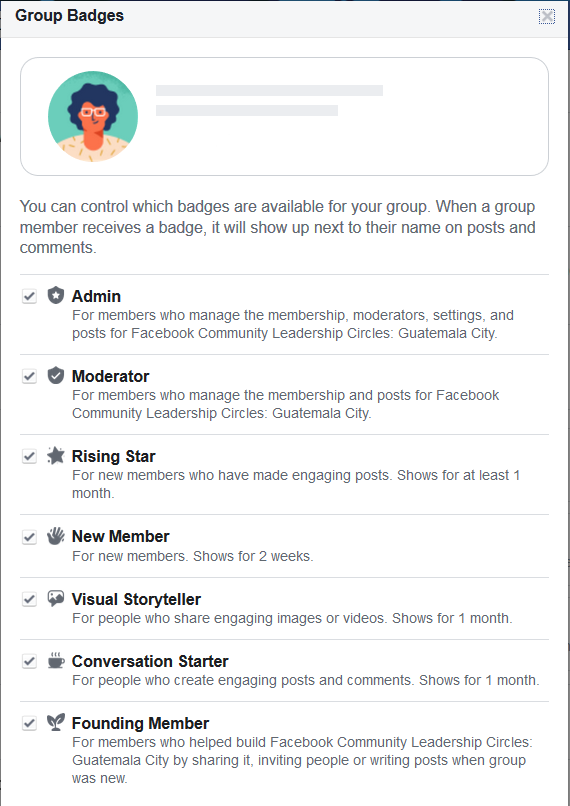
Ideas and examples of using certificates for team-building purposes
Various types of certificates and badges are also a great way to motivate employees and improve their engagement. Incentive systems that reward employees who achieve the best results are the most helpful, resourceful, or committed members of the team can be supplemented by personalized certificates issued every month, quarter, or year.
Internal company training should also be combined with an extensive certification. Such certificates can be attached to employees' social media profiles, working as a motivator for fellow team members and perhaps attracting new talent to the company.
These kinds of certificates are issued by companies such as General Motors, Deloitte, Marriott, and ArcelorMittal.
GM Recognition Program created by General Motors: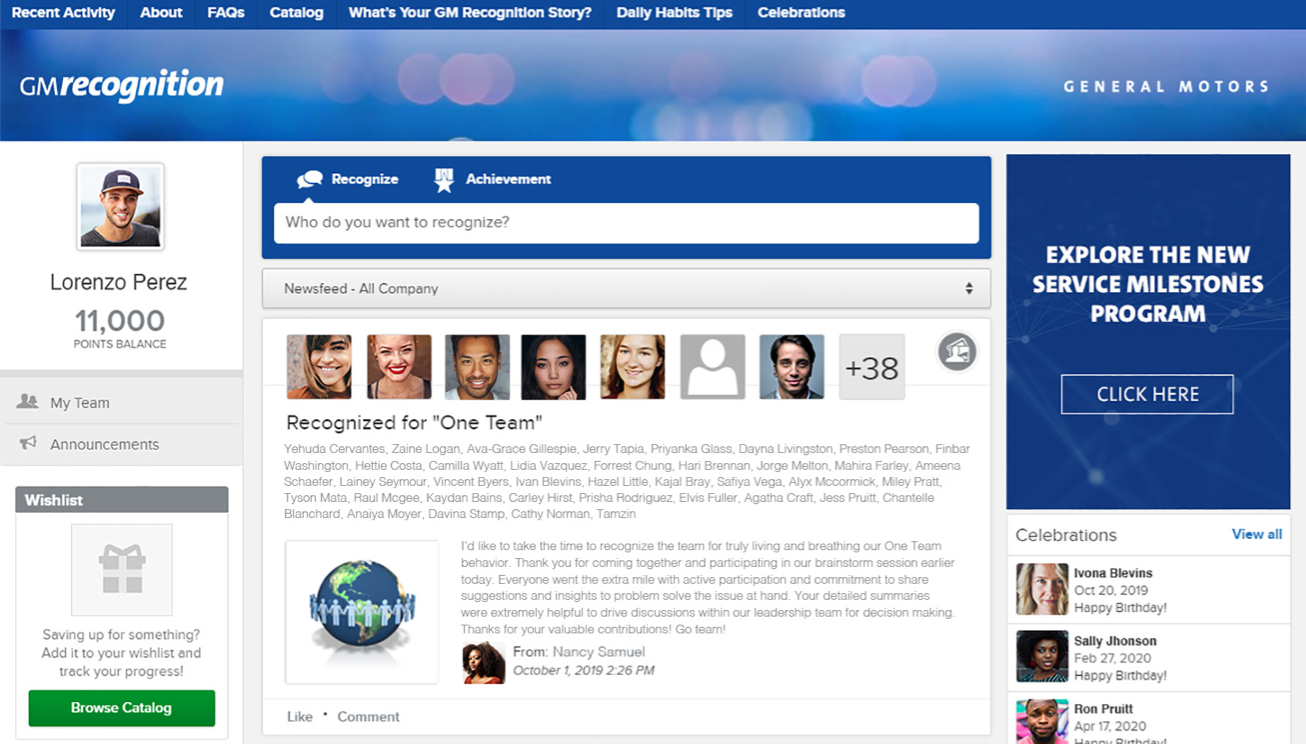
Marriott's award for the most engaged employees. They receive Awards of Excellence certificate:

Ideas and examples of using certificates in EdTech companies
Companies operating in the edTech industry, i.e. those that create e-learning products, should treat certificates and badges as a very important element of their marketing and sales activities.
By edtech businesses I mean, first of all, those companies that offer LMS (Learning Management System) systems for managing virtual classrooms and conducting theoretical or practical classes, tools for creating quizzes, but also apps enabling individual learning.
Using certificates should be one of the cornerstones of edTech marketing because every certificate is a potential advertising material of your learning tool or online course. The more attractive the certificates you create are (both visually and content-wise), the more likely the certificate receiver will be to share it with their network.
And it provides free reach for your product or service and builds a positive image of your brand among potential customers.
Edtech has been surging in recent years (the growth of global investment in products and services from the industry has increased by 15% in 2020, telling the value of 6.4 billion euros). Therefore, the list of examples of edTech companies issuing certifications could be really long. The most popular ones may include Coursera, Udemy, or Skillshare.
Certified issued by Udemy and shared on Twitter:
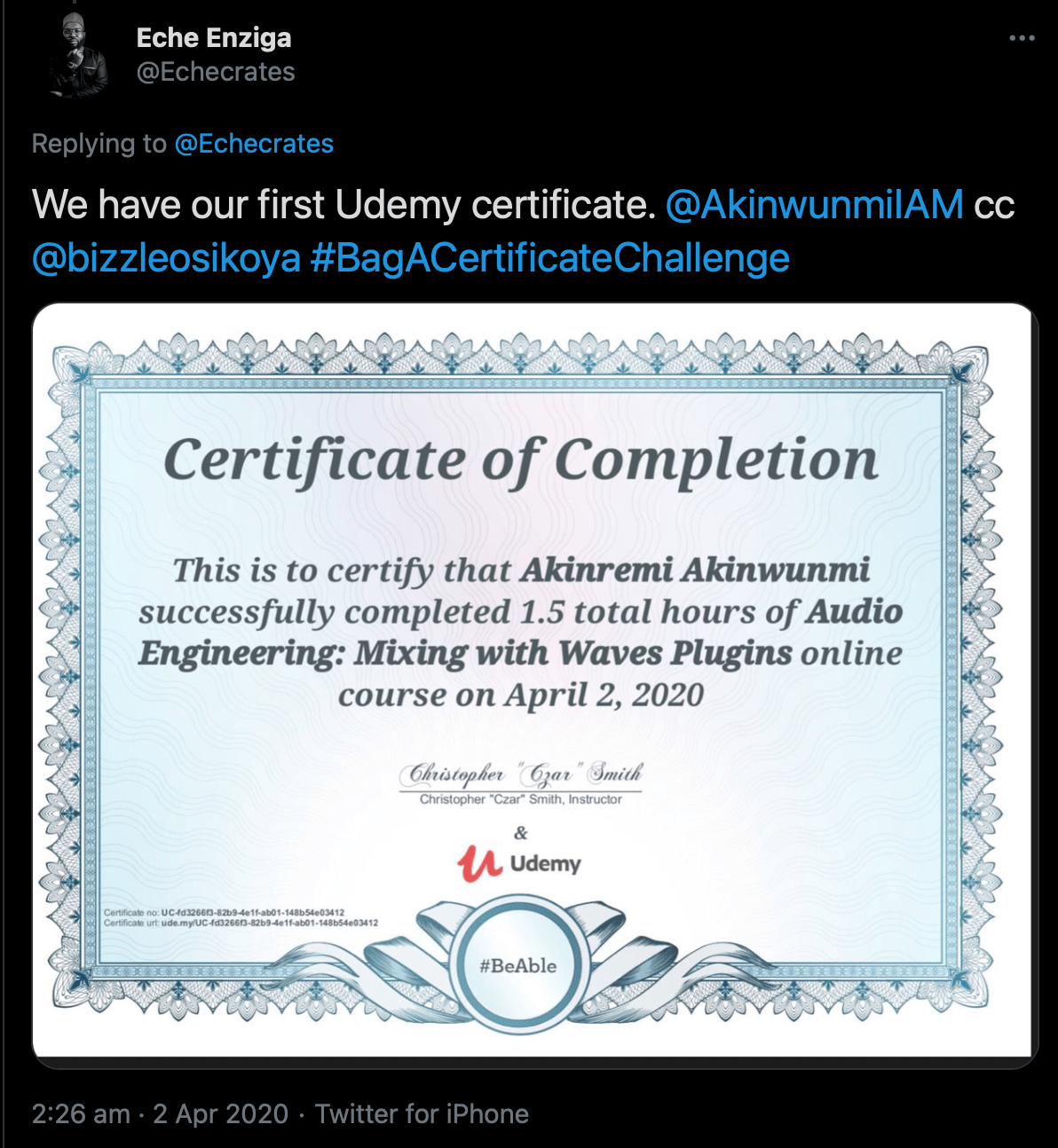
Users of the well-known language learning app Duolingo can get similar certificates:
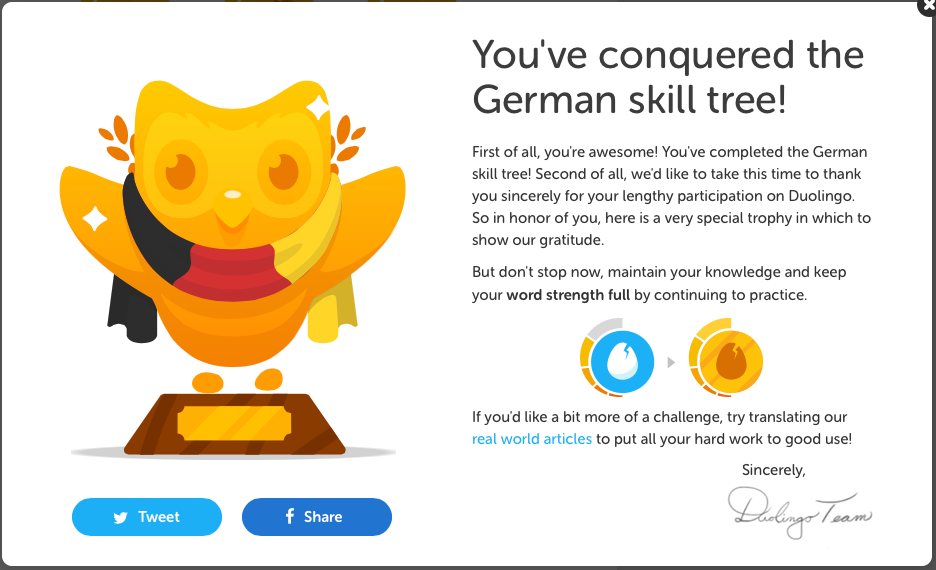
Certificate obtained by a Coursera user:
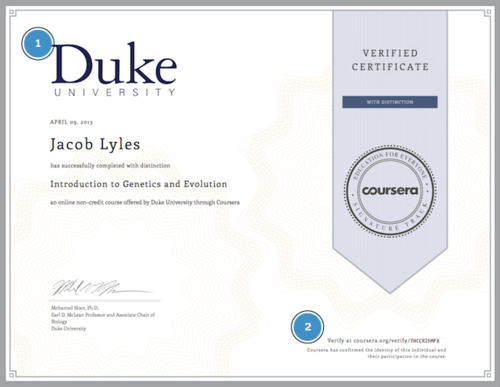
Benefits of creating and issuing certificates
As you can see, there are many ways to use certificates as a marketing tool to drive your business forward. I also summarized a list of the benefits of creating certificates.
1. Building brand awareness through an increased marketing reach
Every time the person who received your certificate shares it on social media or links it on their profile, your brand is presented to other users completely free of charge. They see your logo, your company name and so, in a nutshell, you build awareness of your brand among people with a similar profile as the person who shared the certificate they received from your company.
This is why certificates are an essential part of marketing efforts for all kinds of activities. And what’s best,it's a completely free marketing channel!
2. Increased employee motivation and supporting recruitment marketing
Creating and sending certificates after training or course increases employee motivation and satisfaction, and increases employee loyalty. Receiving a certificate enables them to share their accomplishments and let others know that they are skilled and ambitious professionals.
Certifications shared by existing employees can also support the search and recruitment processes for new employees. Similarly to building brand awareness among potential customers, here you are building your company's image as a good employer.
3. Increased interest in a course and more participants
If you create digital educational products, issuing certificates should be one of the cornerstones of your marketing. People who have completed a course or training are the best advertising "channel" you can imagine. Having them share their certificates on social media, in their portfolio, on their resume, or in their email footer will increase interest in your course, and that will positively influence your bottom line.
Many of the benefits of creating certifications can apply to any type of company. However, depending on the industry or type of business, these benefits are achieved in many different ways. Therefore, I hope this article will be useful for B2B, and B2C companies, businesses offering digital learning products, as well as those businesses that want to use certificates to build and motivate their team.
You already know that certificates are an effective marketing tool that can be used in both B2B and B2C marketing activities and that certificates are a great way to motivate your team and to show employees appreciation. Certificates are also an important part of a digital marketing strategy for educational products.
Now you only need certificate creation software that will allow you to issue different types of documents, diplomas, certificates quickly and efficiently etc. Certifier is such a tool.
Certifier - professional online certificate creator
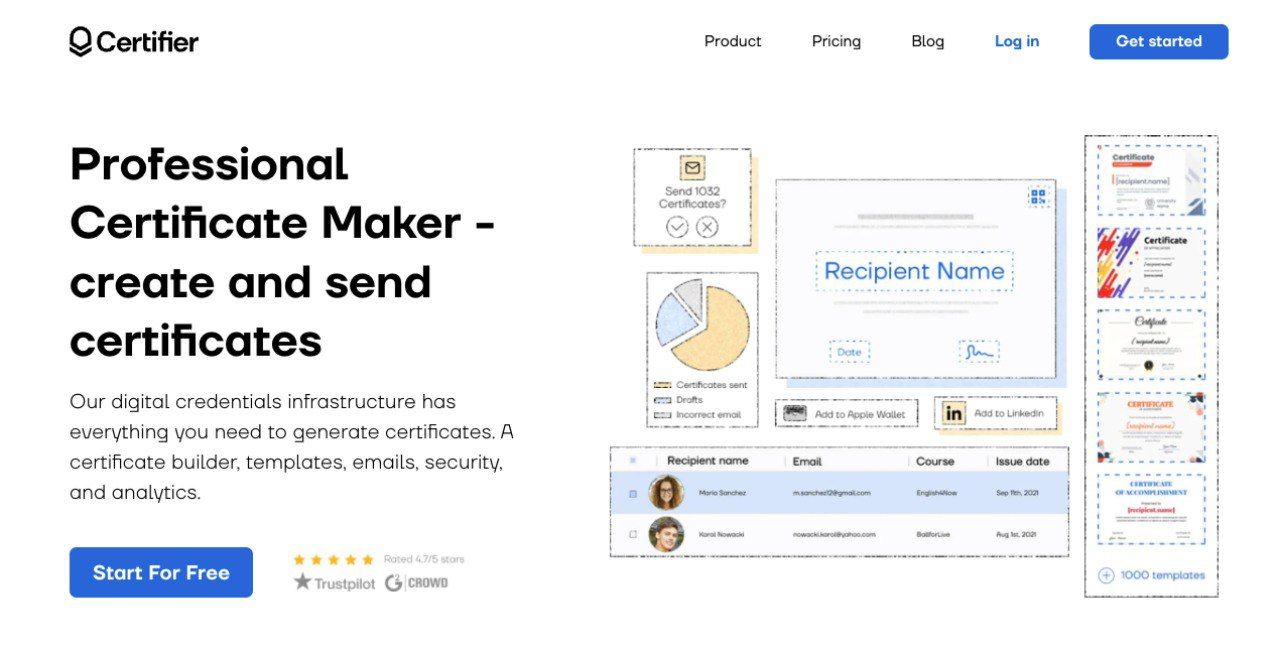
Certifier is the best tool for creating and managing certificates. This certificate creator offers tons of useful features and is very easy to use.
Certifier allows you to design, create, issue, and automatically send certificates to selected recipients. Every step of the certificate issuing process is done in a convenient editor. Using it you can personalize certificates and customize them according to your needs. It is worth mentioning that Certifier offers a very large library of free certificate templates that is available to any user, even within a free account
If you need to customize the look of the templates to match your company branding or want to keep them in a particular style, you can always create a certificate design from scratch. As I already mentioned, you can also use this tool to personalize certificates by filling them out with recipients' data using dynamic attributes, e.g. enter the recipient’s first and last name, certificate issue date, certificate ID, etc.
You can also download each certificate and save it in a format of your choice, such as PDF and ZIP.
Summary
Companies in various industries create and issue certificates so that other organizations or individuals can get proof of their skills and turn it into further business or professional success.
If you want to join them and add another building block in a form of certificates to your marketing strategy, try Certifier. Certifier offers useful features and an intuitive interface, and this combination will help you achieve your goals quickly.
Click here to create a free account and test the tool.

- SaaS Growth
- Digital Credentials
- APIs
- Product Marketing
- Company Operations
CEO and Co-Founder
Sergey is CEO and Co-Founder of Certifier, a Forbes 30 Under 30 honoree building digital credential infrastructure for 2,000+ organizations worldwide and shaping the future of credentialing.

